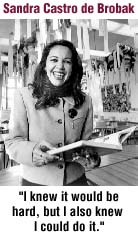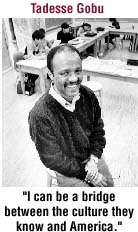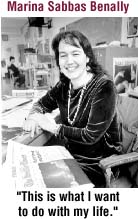Photos by Jerry Gay

![]()
In Washington state, 22.5 percent of public school children are minorities, while only 6.5 percent of public school teachers are minorities. Two-thirds of the school superintendents in the Puget Sound area have ranked the need for minority teachers at "9" or higher on a priority scale of 1-10.
It's a statewide problem that Seattle Pacific University is working to solve, in part, through its Graduate Secondary Teacher Education Program, or "G-STEP."
Since 1991, G-STEP has helped minority teaching assistants gain their full teaching certification, qualifying them as teachers in schools throughout the region. Thanks to scholarships funded by Boeing and Seafirst Bank, the students enrolled in a two-year program of evening and summer classes at SPU, with the additional option of earning a master's degree in teaching.
"The stories of G-STEP graduates testify to the value of this program, which was carefully designed to meet a specific need," says Mark Pitts, dean of Seattle Pacific's School of Education. "SPU wants to increase diversity in the classroom and, just as important, we want to place qualified, caring people there. This is a privilege and an opportunity for us."
![]()
 It's never easy starting over. But imagine doing it in a different culture and a different language.
It's never easy starting over. But imagine doing it in a different culture and a different language.
That's what Sandra Castro de Brobak did. Born and raised in sunny Mazatlan, Mexico, Castro de Brobak was an accomplished teacher when she met and married an American. Transplanted with her husband and young son to the chilly Northwest corner of the U.S., she wasn't sure what lay ahead.
Castro de Brobak knew education, so she went to work as a teacher's assistant. "It was a little discouraging," she remembers. "They couldn't accept my Mexican credentials." She needed to be certified, but that meant big challenges.
There was a gauntlet of tests just to get into Seattle Pacific's G-STEP program. "The last time I went to school was 10 years before and here I had to take tests in another language!" she laughs. "I knew it would be hard, but I also knew I could do it."
Accepted into the program, she met the certification requirements, then entered the master's degree track. Later, she was hired at Stadium High School in Tacoma as a part-time Spanish teacher, which quickly turned into a full-time position.
"So many talented people can't afford to become teachers," says Castro de Brobak. "I feel very blessed. This program was a great opportunity."
![]()
 In Ethiopia, Tadesse Gobu taught briefly in a school run by German missionaries. Even without formal training, Gobu was welcomed as a teacher: "In a blind country, a one-eyed man is king," he explains. He didn't forget teaching, even after leaving home to attend college in Boston, where he later earned a degree in economics.
In Ethiopia, Tadesse Gobu taught briefly in a school run by German missionaries. Even without formal training, Gobu was welcomed as a teacher: "In a blind country, a one-eyed man is king," he explains. He didn't forget teaching, even after leaving home to attend college in Boston, where he later earned a degree in economics.
Civil war in his country kept Gobu in the U.S. as a political refugee, and in 1983 he brought his young family to Seattle. He worked as a teaching assistant in the public schools, a position that required fluency in Amharic and Oromo -- languages spoken in Ethiopia.
Although he enjoyed helping bilingual students, Gobu knew he was under-utilized as an assistant. He wanted to return to school, but financing such an education seemed impossible. A G-STEP scholarship made the difference.
Gobu earned his teaching certification as well as a master's degree at Seattle Pacific, and now teaches in Seattle's Bilingual Orientation Center at Sharples High School -- a program that orients immigrant children to the public schools.
A willing mentor, he says the kids relate to him well. "Because I have a Third World background, I can be a bridge between the culture they know and America."
![]()
 "My mother was taken away from her home as a child to a special Indian school. The children weren't allowed to speak their own language. They were told they were lazy and stupid. I don't think she's ever really recovered from it," says Marina Sabas Benally, who adds that she was luckier than her mother.
"My mother was taken away from her home as a child to a special Indian school. The children weren't allowed to speak their own language. They were told they were lazy and stupid. I don't think she's ever really recovered from it," says Marina Sabas Benally, who adds that she was luckier than her mother.
Born into a poor but close-knit tribe on Canada's Vancouver Island, Benally was raised for a time in a gentle, loving community. But with no school in the village, her mother moved to the city of Victoria to work as a maid so Benally could attend school.
A good student, Benally eventually went to law school, and even practiced for several years, but the work disheartened her. "It was adversarial, opposite to what I was taught to believe."
Benally found her niche as a volunteer in Indian Heritage School, an Alternative School in the Seattle Public School System. "I loved it. I realized this is what I wanted to do with my life." Without certification however, she could not teach. When she heard about Seattle Pacific's program for minority teaching assistants, and the available scholarships, she jumped at the chance.
Now teaching social studies to at-risk Native American kids, Benally links her vocation to her mother's suffering in school. "I look at the faces of my students, and I love who they are. I tell them they are precious."
![]()
 She had raised three children and administered a senior citizen housing program for many years when Camellia Lee decided it was time for a change: either retirement or teaching. A lot of kids are glad she chose teaching.
She had raised three children and administered a senior citizen housing program for many years when Camellia Lee decided it was time for a change: either retirement or teaching. A lot of kids are glad she chose teaching.
Lee was part of the first cadre of students in the G-STEP program at Seattle Pacific. Although she knew it was going to take work, her motivation was powerful.
"I wanted be in a position where I could really help children," she recalls. "When I was working in housing, I'd see teens lolling around, and I wanted to do something to reach these kids, to teach them to think and to make better decisions."
With her G-STEP scholarship, Lee became a certified teacher, endorsed in special education, then went on to earn her master's degree. "It was a very rigorous program," she says. "You had to be committed to do it."
Now teaching language arts and special education at Ingraham High School in Seattle, Lee says she's where she belongs. "I've been put in a place where I can do my best.
"Once I had decided I wanted to be where I could make a difference, everything fell in place, just like clockwork," she says. "I feel very honored and grateful to be doing this work."
![]()

| Please read our
disclaimer.
Send any questions, comments or correspondence about Response to
jgilnett@spu.edu or call 206-281-2051. Copyright © 1999 University Communications, Seattle Pacific University.
Seattle Pacific University |